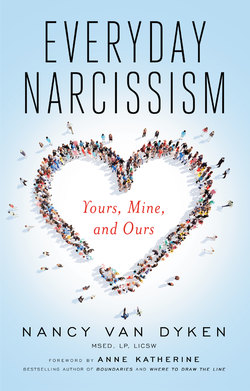Читать книгу Everyday Narcissism - Nancy Van Dyken - Страница 16
На сайте Литреса книга снята с продажи.
Оглавление2
Everyday Narcissism vs. Clinical Narcissism
“When the healthy pursuit of self-interest and self-realization turns into self-absorption, other people can lose their intrinsic value in our eyes and become mere means to the fulfillment of our needs and desires.”
P.M. Forni
It’s important to understand the difference between everyday narcissism and what is often called clinical narcissism.
Clinical narcissism, technically known as narcissistic personality disorder, is a diagnosable mental illness, one of ten types of personality disorders. The Mayo Clinic offers the following definition of a personality disorder:
A personality disorder is a type of mental disorder in which you have a rigid and unhealthy pattern of thinking, functioning, and behaving. A person with a personality disorder has trouble perceiving and relating to situations and to people. This causes significant problems and limitations in relationships, social encounters, work, and school.
Personality disorders are divided into three groups: anxious, suspicious, and emotional/impulsive. Clinical narcissism is an emotional/impulsive personality disorder.
Everyday narcissism, however, is not a personality disorder—and not something that can be diagnosed by a therapist. It’s a familiar outcome of being raised by less-than-perfect parents in a less-than-Utopian society. It’s not healthy, yet it’s extremely common.
In recent years, the words narcissism and narcissistic have become widely used in everyday conversation. In that context, they usually refer to someone who is extremely self-involved and doesn’t care about anyone else. People often use the term to refer to a boss, coworker, family member, partner, or neighbor.
This informal adaptation of a clinical term roughly parallels the use of the word depressed. A lot of people use that word when they temporarily feel sadness, hopelessness, or despair. This is a very different state from someone who suffers from clinical depression, which is a serious, sometimes chronic, and sometimes life-threatening disorder. Something similar happened in the 1980s and 1990s, when generous, cooperative people were occasionally labeled codependent in everyday conversation.
Let’s dig a bit deeper into clinical narcissism.
People with narcissistic personality disorder have a constant and overwhelming need for attention—and, usually, for admiration, praise, and validation. At a social gathering, they dominate the conversation. At work, they seek the highest possible position and regularly insist their ideas are the best.
Clinical narcissists typically exaggerate their accomplishments and talents—and genuinely believe those exaggerations. They lie often, blatantly, and shamelessly. They have a greatly overblown sense of their own importance and often come across as extremely arrogant. They tend to be bossy, judgmental, perfectionistic, controlling, and power-hungry. They have no qualms about exploiting, cheating—or, in some cases, destroying—other people to get what they want.
GEORGIA
Georgia lies in a hospital bed, only days away from death. Her daughter Clara sits besides her, holding her hand; her dog Brownie relaxes at the foot of her bed.
Georgia says to her daughter, “Have you made all the arrangements for my cremation and burial?”
Clara nods and squeezes her mother’s hand. “It’s all taken care of, Mom.”
“One other thing,” Georgia says. “I want Brownie cremated and buried with me.”
Clara pulls her hand away. “Brownie’s still young and healthy. He’ll probably live another six or seven years.”
“No. I love Brownie as much as any human being possibly can. I want him cremated, and then I want you to mix his ashes with mine.”
Georgia’s wishes are not a reflection of everyday narcissism. They are symptoms of narcissistic personality disorder, a serious mental disorder.
People with narcissistic personality disorder have a strong need to be right in every situation. They genuinely believe they know and understand everything, and that they are never wrong. They also become aggressive when anyone challenges them.
This book is not about people with narcissistic personality disorder. It’s about you and me.
Most clinical narcissists have a strong sense of entitlement. They feel they are owed constant adulation, attention, and praise. They also feel they deserve to always get their way. Yet they have little or no insight into themselves, and they are utterly unable to empathize with someone else or see a situation from their viewpoint.
Perhaps most notably, people with narcissistic personality disorder don’t realize there’s anything wrong with them. In fact, they think that everything about themselves is just right—and better than everyone else.
This book is not about people with narcissistic personality disorder. It’s about you and me—and our relatives, partners, coworkers, neighbors, and friends. It’s about a form of emotional wounding that is as common as headaches and sore throats, yet far more painful and damaging. Most of all, it’s about healing the wounds of your own everyday narcissism and creating the life you truly long for.
